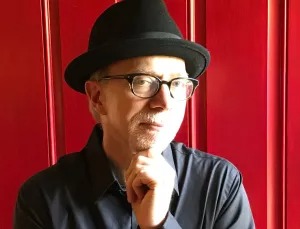Black Country Communion: "If I wasn’t in this band, I'd want to be in this band"
They were a supergroup with the world at their feet, but they let their world implode. After a “long hiatus”, Black Country Communion are back, with a new album and a brand new perspective
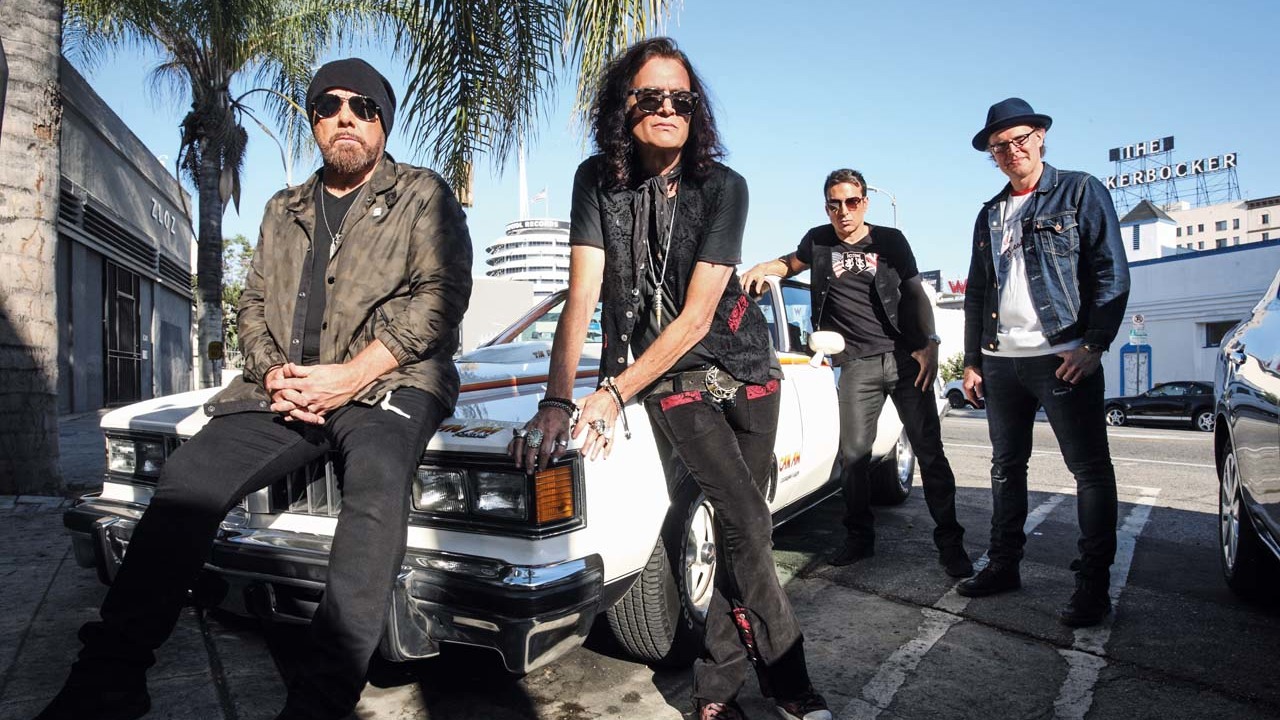
It seems nobody told Glenn Hughes that lead singers are supposed to be fashionably late – for everything. On a recent Sunday afternoon in Los Angeles, the veteran vocalist/bassist arrives at photographer Neil Zlozower’s studio before any of the other members of his band, Black Country Communion.
“I never went in for the prima donna shit,” he says with an elegant yet dismissive wave of his hand. “Believe me, I’ve seen enough of that behaviour over the years. I could give lessons if I wanted to. No good can come from it. Be a pro, I say.”
Guitar ace Joe Bonamassa is next in the door, and he quickly informs Zlozower that he’s on the clock. Bonamassa keeps to a tight schedule most of the time, and tomorrow morning he’s flying to Havana to shoot a documentary. “We’re going to do a reverse Buena Vista Social Club thing,” he says. “I’m gonna grab a bunch of Cubans and try to play the blues with them. We’ll see what happens. If it works, that’ll be great. If it doesn’t, well, it’ll be a different kind of film.”
Hughes and Bonamassa greet each other with warm hugs and spend a few minutes catching up on their recent activities. Their camaraderie is natural and unforced – and somewhat surprising, given the way the two musicians sniped at each other on social media back in 2012, a bitter public exchange that resulted in the fast implosion of Black Country Communion following the release of their third album, Afterglow. “We were like visionaries,” Bonamassa says. “Glenn and I invented mean tweets before they became presidential.”
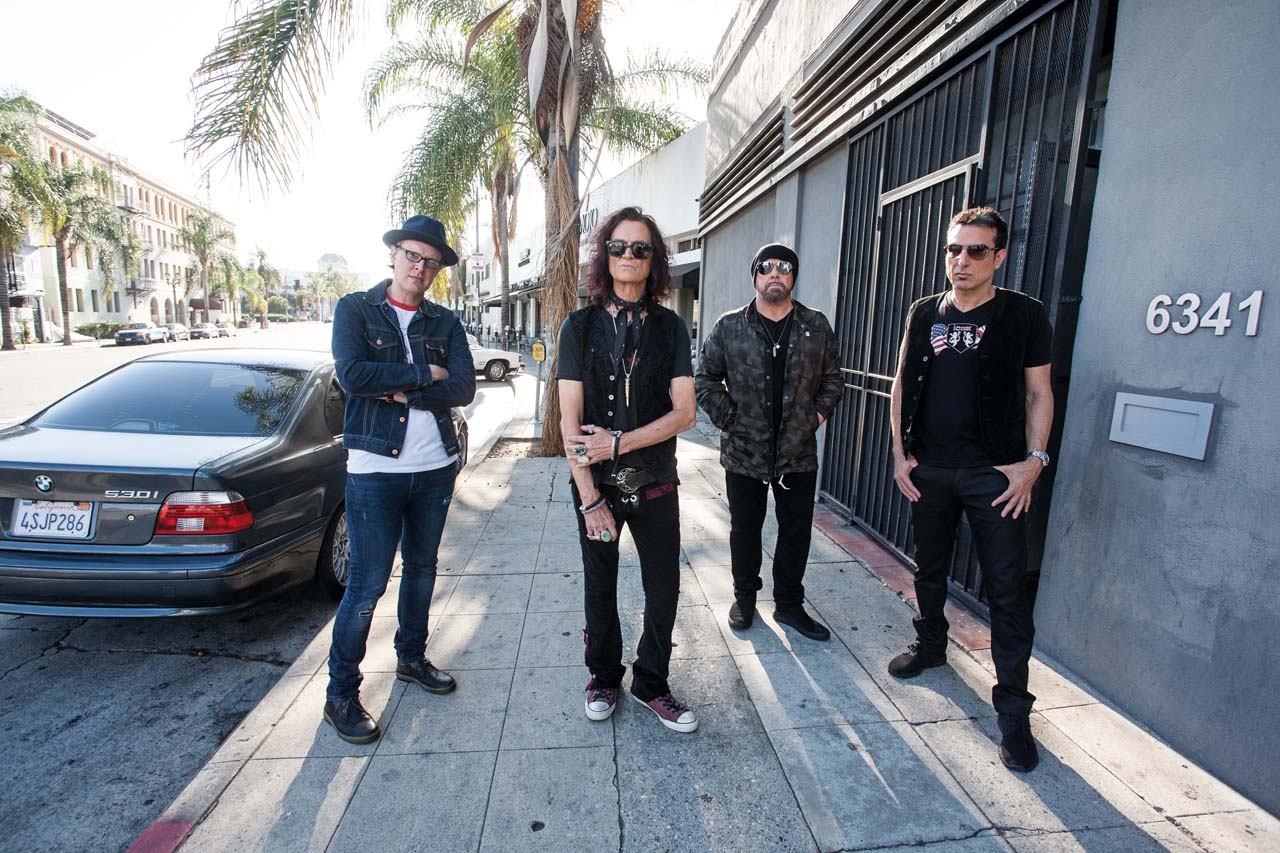
Hughes lets out a good-natured laugh, perhaps hoping to downplay the experience. But Bonamassa is serious – he seems to regard the matter with a sense of pride: “Well, we did invent mean tweets. We should get ahead of that and own it.”
Owning their past is something the members of Black Country Communion are slowly coming to terms with. And they have good reason to, as it now seems as if they’re bucking for a future. They’ve got a righteous and robust new album, BCC IV, out this month, and they don’t mind if you refer to it as a comeback.
“It’s our first record in five years – I guess that’s what you call it,” Hughes says. “But here’s the thing: it’s really a great record. When you hear it, you’re hearing me going back to my roots.”
Sign up below to get the latest from Classic Rock, plus exclusive special offers, direct to your inbox!
He beams a high-wattage smile and adds: “I can’t be modest about this. I just have to crow. I’m such fan of this band. If I weren’t in this band, I would want to be in this band.”
Without prompting, he’s quick to stress that the disharmony between him and Bonamassa wasn’t as deep-seated and explosive as had been reported when the whole thing collapsed. “It was more like misunderstandings,” he says. “Joe and I had never fallen off the rails. That’s a big misconception. Oh, sure, there were some moments we went: ‘Oh, God. What now?’ But we were always friends. It wasn’t like other bands that have these really horrible break-ups.”
He pauses, searching for the right words. “And ours wasn’t so much a break-up as it was a long hiatus.”
“It’s true,” Bonamassa interjects. “We never actually lost contact. We just stopped playing. And that was a shame, because Glenn is the whole reason why I got into this thing. I was a huge Glenn Hughes fan. I was honoured to be in a band with him.” He throws the singer a smile. “And I still am.”
Black Country Communion began as the brainchild of producer Kevin Shirley, who has worked as Bonamassa’s regular sonic architect and chief confidant since the two first worked together on the guitarist’s You & Me album in 2007. After witnessing an impromptu jam between Bonamassa and Hughes, Shirley brought in drummer Jason Bonham and former Dream Theater keyboard player Derek Sherinian with the idea of putting a fresh coat of paint on 70s-era classic rock.
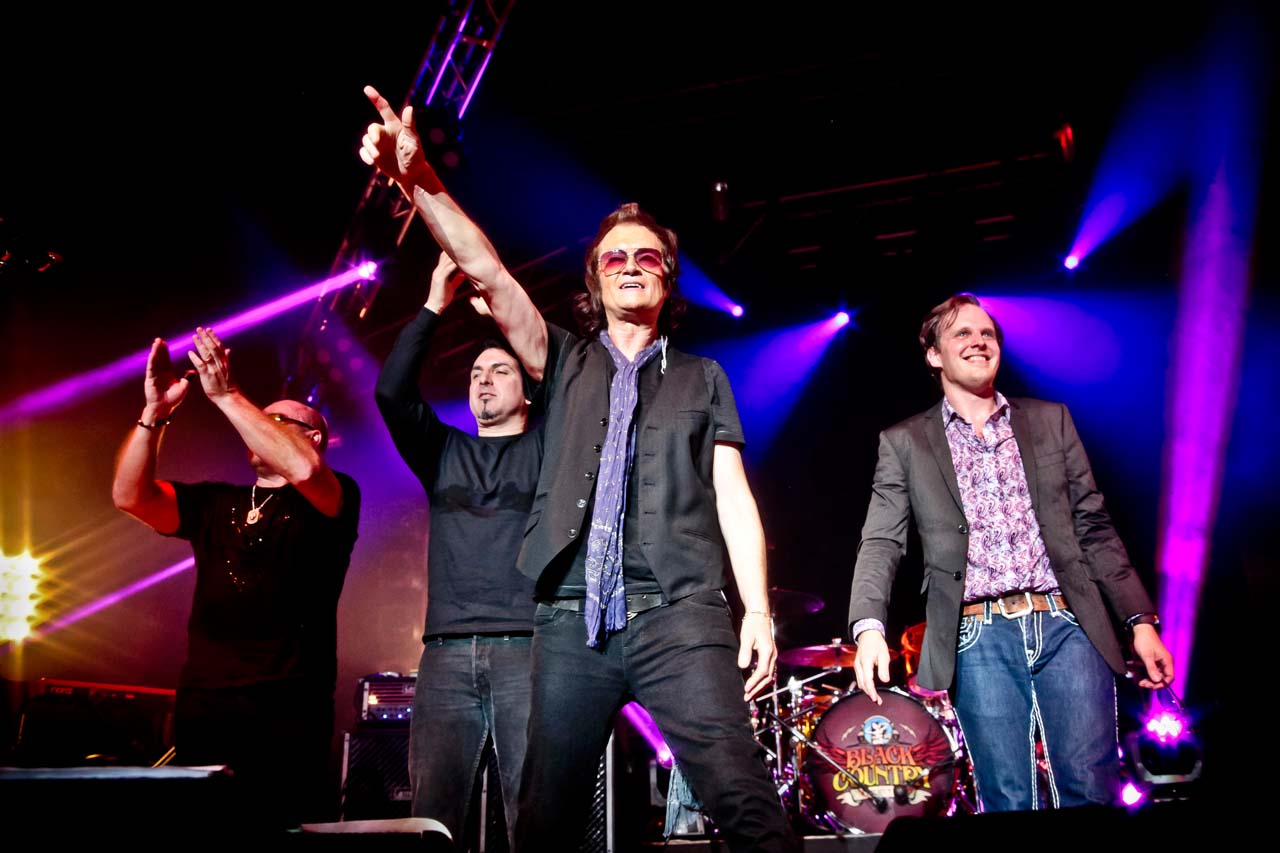
“I thought they could be a hark back to the glory days of great bands like Free, Bad Company, Led Zeppelin and Deep Purple,” Shirley recalls. “And boy, did we have the right personnel! Those were my exact thoughts when putting these guys together. The reason why I thought Derek Sherinian was a good idea was, after working with him on a Dream Theater album, I thought that the progressive rock element he could bring could introduce an interesting new dynamic to the group.”
Sherinian arrives at the studio next, and he too greets his bandmates affectionately. He looks fit and healthy, radiating a cool confidence – a swagger, really – to go along with his newly toned‑up physique. “I got divorced and then I hit fifty,” he says. “You get to a point where you wanna look good, you know?”
He says he had few expectations when he was first brought into the project. “I got a call from Kevin, who asked if I wanted to record a few songs in Malibu for a couple of days. I knew of Glenn and Jason, but I didn’t know Joe at all. We weren’t even thinking of doing a whole album at that point, much less anything else.”
Those couple of days got extended to a full week, by which time the quartet’s song fragments and jams had morphed into an entire album of hard-hitting blues-based hard rock. “It came together so quickly,” says Bonamassa. “What started out as this experiment became something bigger. I don’t think anybody gave anything much thought until we heard the first mixes, and then we went: ‘Wow! This is pretty damn good.’ It was classic rock but with new songs. It had that old seventies feel but it didn’t sound dated in any way. Once everybody heard it, we all thought: ‘I think we might have something here.’”
Patting Bonamassa on the knees, Hughes says: “It was pretty obvious that these four talents together were the right guys at the right time. It was like, okay, now here’s a band.’
“Right. But it was never micro-managed,” Bonamassa stresses, “like we were in a boardroom or something. So we all decided, okay, we’ve got something here, let’s make it work.”
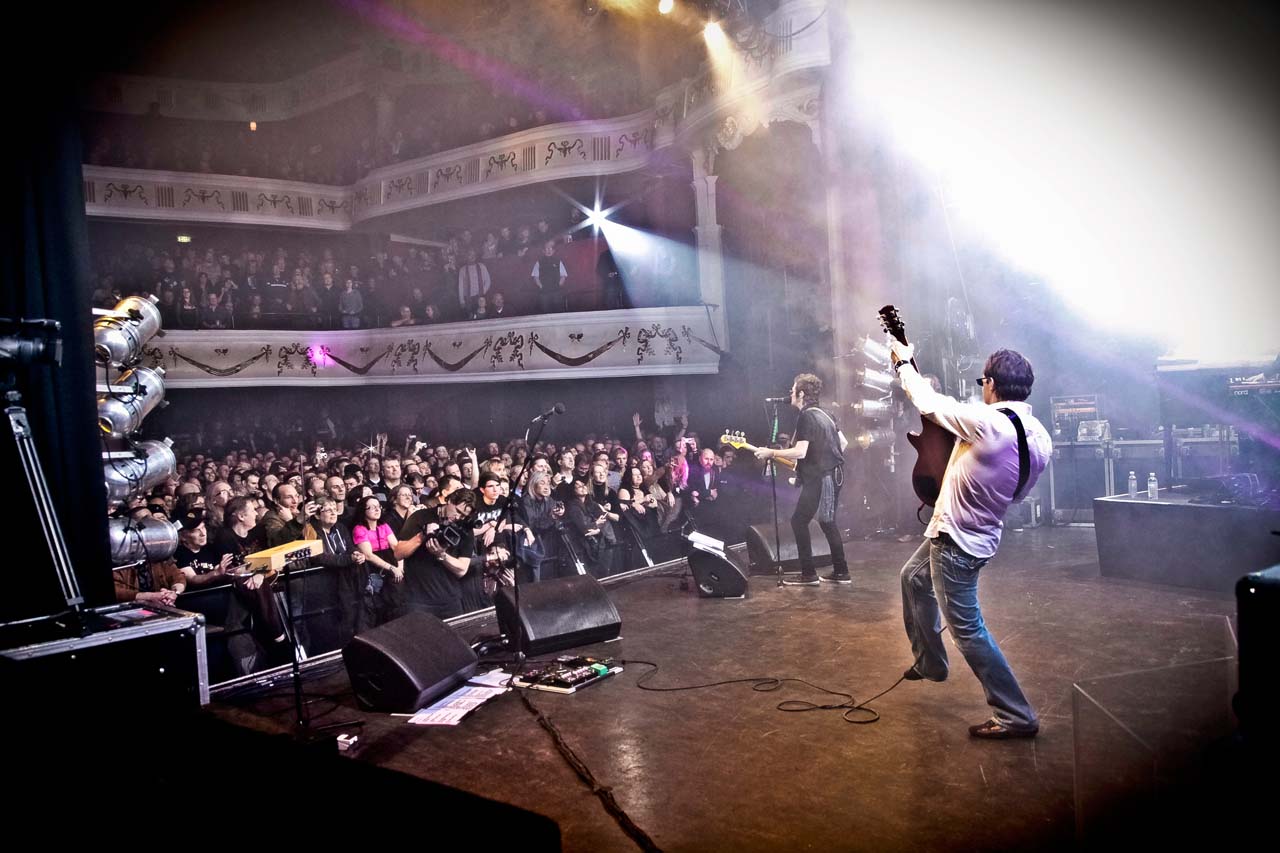
Originally the group had christened themselves Black Country (a reference to the part of the West Midlands where Hughes and Bonham both grew up), but after the threat of legal action from a band based in Baltimore, Maryland, with the same name, they decided to add ‘Communion’. BCC’s self‑titled debut album was released in the autumn of 2010 to rave reviews and immediately picked up brisk sales. “We were all pretty surprised,” Sherinian says. “I don’t think any of us expected such strong and immediate acceptance. How many bands can make a record and do business right away? We were all pretty excited, and so we wanted to get out there and play.”
From the beginning, the question remained about whether BCC could ever manage to be a big gigging band. Although three of the members had various commitments – Hughes toured behind solo albums; Bonham divided his time between Foreigner, Sammy Hagar’s The Circle and his own Jason Bonham’s Led Zeppelin Experience; Sherinian, since leaving Dream Theater in 1999, has performed with a variety of acts – all were gung-ho on touring as much as possible. Bonamassa was the stumbling block when it came to extended road work. Even before the group recorded their debut album, his solo career as a modern blues master was on the rise. “I’d been making my records since 1999,” he says. “I was having success and things were building nicely. In 2008 or 2009, that’s when it started to get interesting – the shows were getting bigger. I was like: ‘Wow. Looks like this thing I’ve worked for is finally happening.’”
“Joe was very clear early on that he had a solo career going and that things would need to work around that,” Kevin Shirley remembers of Bonamassa’s availability to tour. “It was generally understood that his own touring would be a priority – although once things got under way with the band it was all kind of forgotten.”
Bonamassa likens his career trajectory at that point to a freight train speeding down the tracks. “You spend your whole life trying to get the train going,” he explains. “You try as hard as you can and push as hard as you can, and then suddenly it starts moving. Then it moves faster and faster. The next thing you know, you’re flying. I was booked for tours a year or two in advance. What do you do, put the brakes on it? It was a problem.”
The demand for BCC dates was growing, and Bonamassa was caught in a bind. “I was like: ‘How do I finesse this with them?’” he recalls. “Here I was, this one thing, my solo career, was moving faster and faster, and then this other thing, the band, started taking off in the opposite direction. What was I to do? I can’t franchise this thing out.”
Given Bonamassa’s commitments, BCC managed to play live just four times during their first year together: as an encore during one of Bonamassa’s own shows in Riverside, California; for an album release gig in front of a select audience at John Henry’s rehearsal studios in London; and two performances in the UK in December 2010, at Wolverhampton Civic Hall and London’s Shepherd’s Bush Empire.
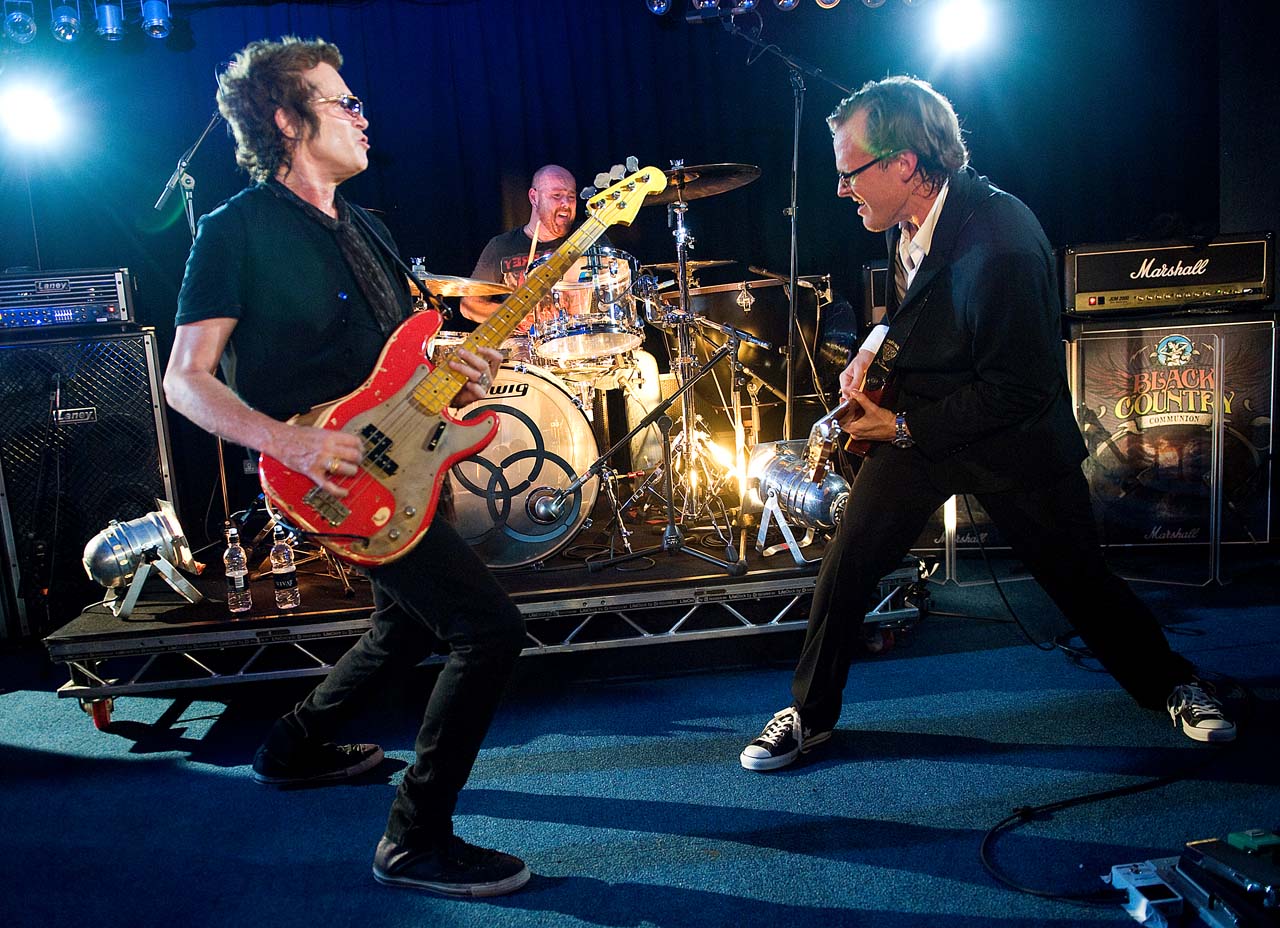
“Those were some of my favourite gigs I’ve ever been involved in,” Bonamassa enthuses. “That gig at the Wolves was so fucking loud and exhilarating – I’ll never forget that moment. It was one of those times when I thought: ‘This is what it’s really like when something is new and fresh and people are seeing it for the first time.’ You don’t get that kind of thing too often.”
Hughes cuts in. “I just want to address this once and only once,” he says, “because I don’t want to hash it through a million times. There were never any problems with us at all. We knew Joe was very busy and we were treading water, so we thought, ‘ Alright, we’ll just have to move forward.’ It was as simple as that.”
Moving forward meant recording another album, which the group knocked out with Shirley in another week-long blast in early 2011. Although Hughes had a bigger hand in the writing than on their first album, the general consensus was that Black Country Communion 2 was a stronger communal effort: Bonamassa’s arena-sized riffs, Hughes’s throaty roar, Sherinian’s majestic keyboard flourishes and Bonham’s terrific drumming had unified into a sum greater than its parts.
Eventually there was a space on Bonamassa’s list of commitments that was big enough to allow for a proper BCC tour. They played just a quick series of dates in the US, but spent considerable time performing in Europe, which was documented on the CD/DVD and Blu-ray release Live Over Europe. The shows were greeted rapturously by fans, but as Shirley remembers it, “Things were going off the rails early on. During that European tour there were rubs between Glenn and Joe that were evident. The truth is, Joe was building a very dedicated fan base with his blues records, and was attracting enough people to justify being out solo – playing the kind of venues BCC were playing, but selling them out.”
By the end of the run, Hughes had the feeling that the band had overplayed its hand. This suspicion was confirmed when the guys landed at Los Angeles International Airport and were waiting for their bags. “Joe looked at me and said: ‘I think next time we should just go out for a couple of weeks,’ Hughes recalls. “I could see it in his eye. I knew what he was going for, what he meant: we did thirteen weeks, it was too long.”
Bonamassa nods, draws a deep breath and says: “Yeah, it was a long tour. Brutal.”
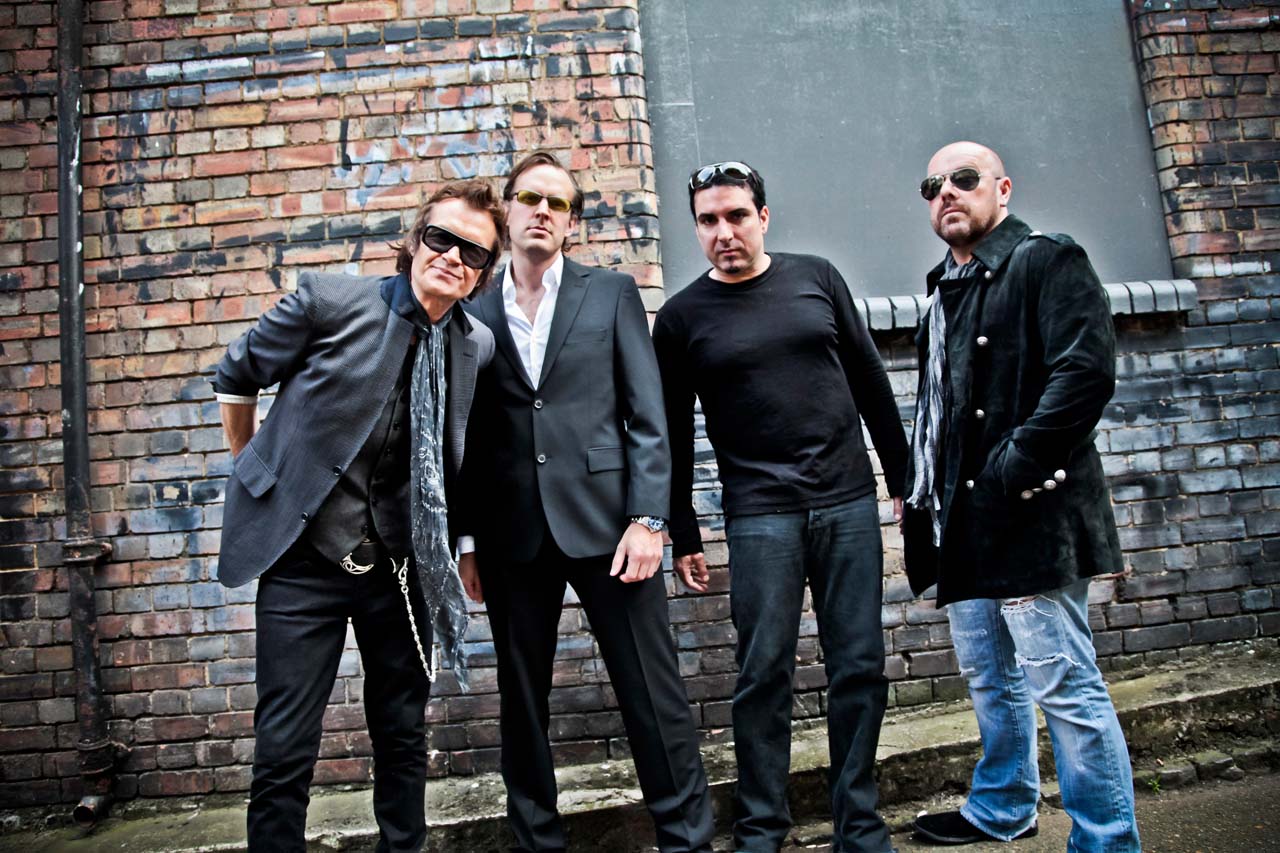
The recording of third album Afterglow, in 2012, proceeded much like the band’s second – Hughes brought in most of the material and the band hammered out the rest from the various riffs and ideas that were floating around. Bonamassa was by now a bona fide solo sensation, and the demands on his time were piling up. He was also becoming, by his own admission, a bit unglued. “It was overwhelming me,” the guitarist states. “I was going from solo album to touring to Black Country Communion album to more touring. I was doing collaborations. I was doing everything that came at me. I really felt like I was on the verge of mentally and physically burning out.”
“I was concerned for him,” Hughes says softly. “I saw what was happening, and I’d seen it before. I’d seen it take down many people. That success you wish for turns around and bites you.”
“There was a six-month period that was really bad,” Bonamassa says. “I was at the point where I wanted to say: ‘You know what? Gardening is going to be my new career. Fuck this.’”
During the making of Afterglow, it was again understood that the opportunities to play live were going to be limited. Hughes claims he was fine with this arrangement, but once he saw that the only post-album release gig on the books was a one-off in Wolverhampton for 2013, he lost it. In an interview just prior to the record’s release, he expressed his frustration and even hinted that the album might be the band’s swansong due to Bonamassa’s heavy road schedule.
“I hate to break it to you, but it just may be,” he said at the time, “because I need to be in a band that tours on a regular basis. If I had a magic wand, I would wave it over everybody’s head and go: ‘Hey, you guys, we’re gonna go and do two hundred shows and we’re gonna be a huge rock’n’roll band globally.’ It’s not gonna happen.”
Hughes claims that he wasn’t trying to use the press to force Bonamassa’s hand into touring more: “I was just being honest. I was disgruntled.” But when he later complained on Twitter about the high ticket prices for Wolverhampton, things went south, and the mean tweets between him and Bonamassa started. “I’m ready to move on,” the guitarist posted. To which Hughes replied: “Me too.” The gig at Wolverhampton was cancelled, and for all intents and purposes, Black Country Communion were finished.
Jason Bonham is the last member of the band to arrive at Zlozower’s studio today – at last. In the midst of his own Led Zeppelin Experience tour, he got caught up in a flight delay in Cleveland. He takes the travel hassle in stride – “What are ya gonna do?” – and is quickly hustled into a small dressing room where a make-up artist attends to him and Sherinian. Like his legendary father, Bonham is a burly bear of a man. Noting Sherinian’s studly calander-man appearance, he chuckles and says: “I tried that workout stuff once. I went running – hated it.”
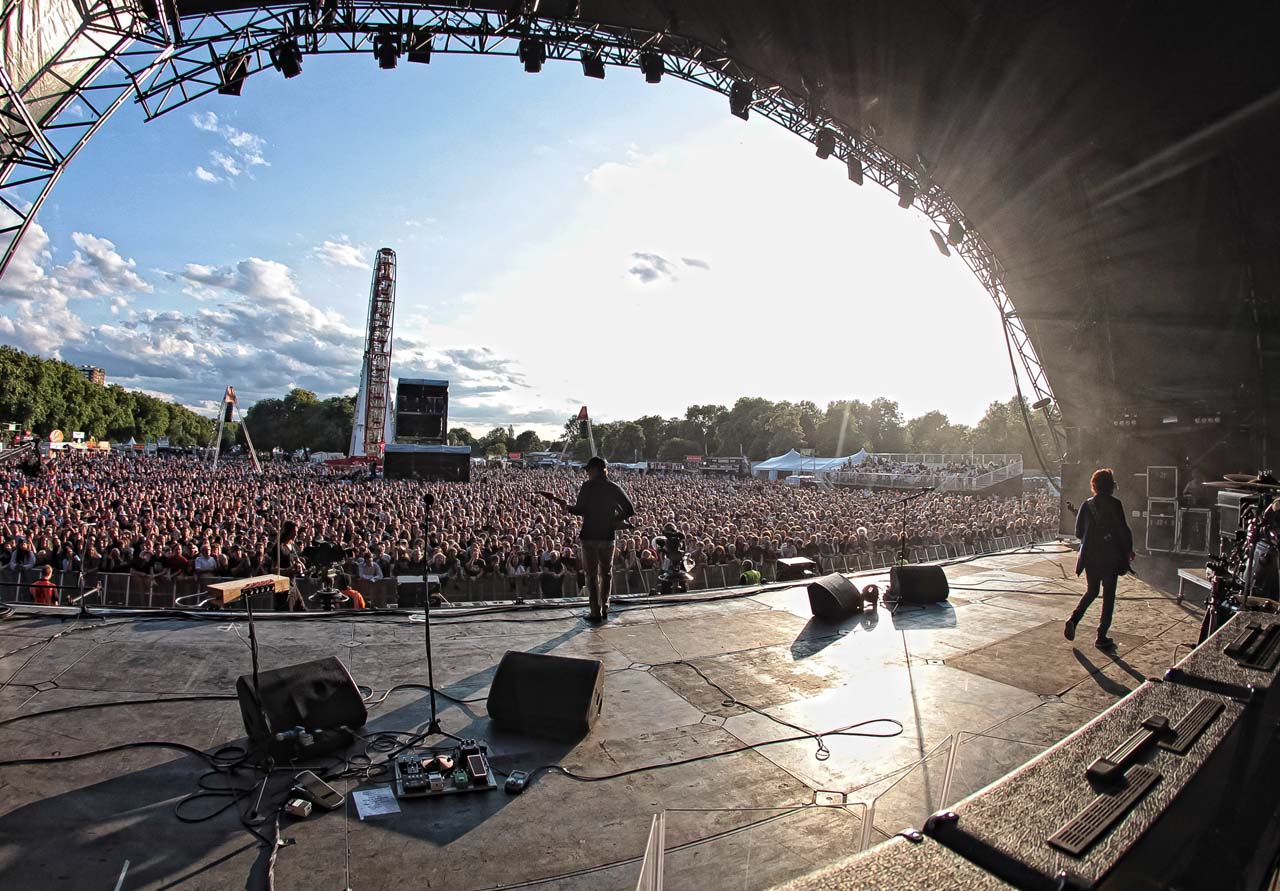
Asked about the cycle of events that led to BCC’s implosion in 2012, he lets out an even bigger laugh and says: “Oh, we’re going to talk about that stuff? I wasn’t involved in it. I was just watching the emails and going: ‘Oh, no…’ You know, you see this happening, and you’re just like, ‘C’mon, guys. Really?’”
Sherinian elaborates: “I was doing a performance with Glenn in Armenia when the conflict first started. I didn’t think anything much, and I told Glenn: ‘Don’t worry. It’s gonna work out.’ I got on a plane and flew back to California, and when I checked my emails I was like: ‘Uh‑oh…’ There were about a hundred of them. When I saw one of them said, ‘Fuck you,’ I thought, ‘Okay, well, I guess it’s over.’”
For Bonham, he’d lived through this scenario before following Led Zeppelin’s triumphant one-night-only reunion show, with him on drums, at London’s O2 Arena in 2007. “People would always say: ‘Why is Robert being a dick?’ They wanted the band to tour. You know, there’s always going to be somebody at fault for a band not working. But when you know what’s inside the situation, you can understand things a little better. With Joe, I kind of get it. He’s a very successful artist in his own right, so it’s hard for him to be expected to take time away from it.”
He pauses, then adds, “Of course, it would have been nice to do more… “
For a brief time, Hughes, Sherinian and Bonham considered continuing without Bonamassa. “There was talk of that, yes,” Bonham says. “We felt very strongly about this band.”
Sherinian says the idea went beyond mere talk, and admits that the trio even auditioned another guitarist – although he won’t mention whom. “Look, there was a lot of interest in people seeing this band, with or without Joe,” he says. “But it didn’t feel right with this other guy.” He adds quickly: “Joe knows about this, I told him. For a second, he was like: ‘I can’t believe you guys would do that.’ And I said: ‘Why wouldn’t we?’”
Soon after the bottom fell out from under BCC, Sherinian hooked up with Bonamassa when he joined the guitarist’s touring band from July 2013 until the end of 2014. Meanwhile, Hughes and Bonham gave the band thing another go with California Breed, a bluesy hard rock trio that also included guitarist Andrew Watt. They recorded an album with producer Dave Cobb, known for his work with Chris Stapleton, Jason Isbell and Rival Sons, and made their live debut at the Whisky A Go Go in Hollywood in 2014.
Ironically, it was Bonham who pulled out of California Breed when the subject of proper touring came up. “I disagreed with what we were going to do live,” he says. “The situation we were looking at was much different than it was for BCC, and I just said: ‘Look, I can’t tour for nothing.’ I’d gotten to a point where that just wasn’t possible.”
Hughes and Watt tried to keep California Breed alive by bringing in former Queens Of The Stone Age and Eagles Of Death Metal drummer Joey Castillo in place of Bonham, but the band came to an end in early 2015.
Back out in the main room of the photo studio, Hughes shakes his head and sighs when asked about this period. “It was a hard, difficult time, for sure,” he says. “California Breed made a great record with Dave Cobb, and we felt really good about it. But it was just impossible to tour, although we did a bit of that. It was tough. You don’t like letting these things go.”
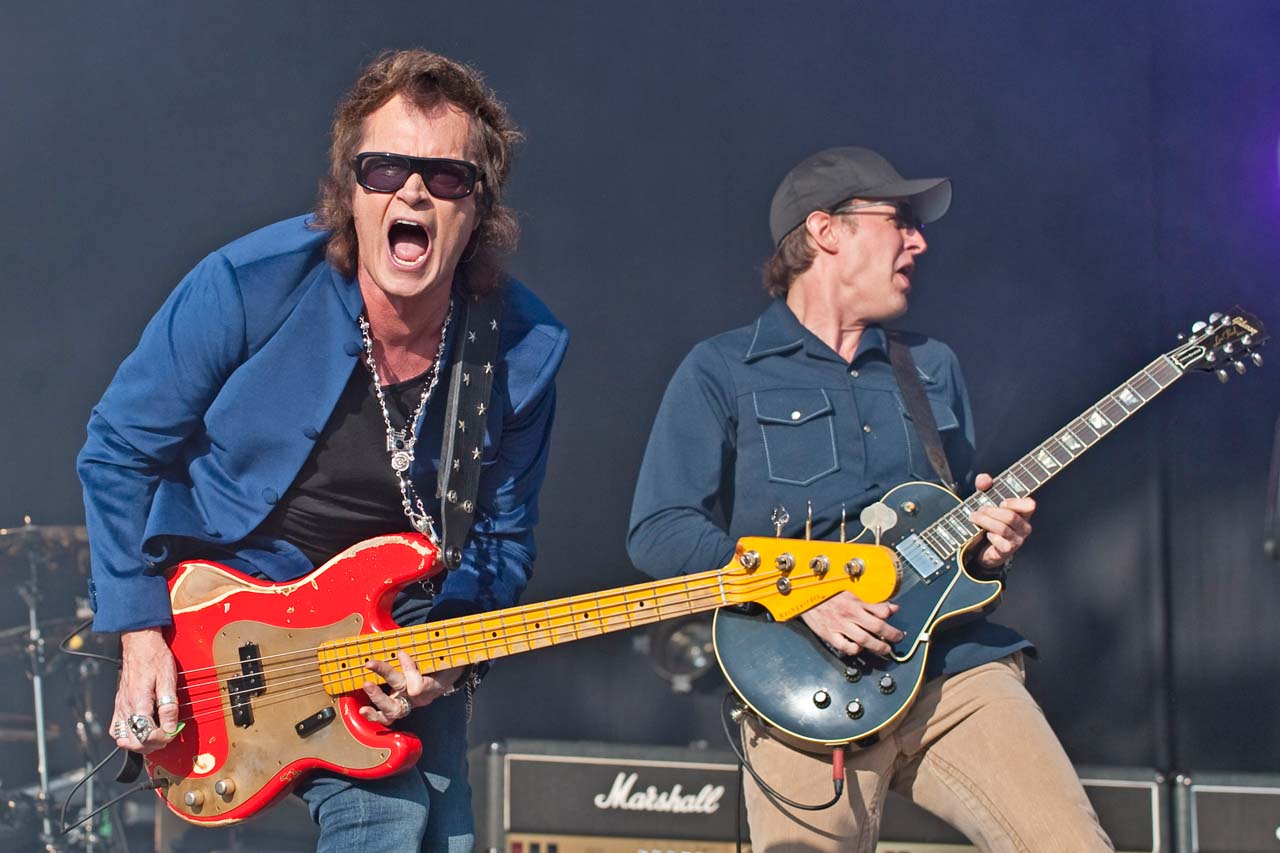
Bonamassa didn’t like being tagged as ‘the guy who broke up Black Country Communion’, and over the next few years he put the band’s past in the rear-view mirror and gained some perspective on what had gone wrong.
“I was probably the chief rug puller back then,” he says. “But even if you’re the rug puller, you don’t want to be told that. When things had built up before, I was thinking: ‘My hairline and my ability to have cognizant thoughts are both in jeopardy at this point.’ So I just disengaged. I disengaged in the only way Italians know how – to throw a cherry bomb into one’s life. That’s kind of what I did, and I can now cop to it in the most honest fashion.
“I was a little hot-headed and immature,” he continues. “It’s something that I’m still guilty of. I spin out over stupid shit. You work on it, especially as you grow older and you see forty coming up. So yeah, one of my limitations is, I get spun out over little shit when I should probably think it through.”
He laughs, then adds: “That’s another reason why I shouldn’t have anything to do with political office. I’d be terrible at it.”
One of the issues Bonamassa processed over the years was Hughes’s disgruntlement over BCC’s touring predicament, and he now says he’s able to cut Hughes some slack for his outbursts in the press.
“Glenn was out there trying to promote a record, and he’s asked all the time: ‘When are you touring?’” he says. “He’s doing this press junket over a week or seventeen days, and that’s what he gets all day long. That’s gotta rattle your nerves after a while. I probably would’ve said the same things that he did.”
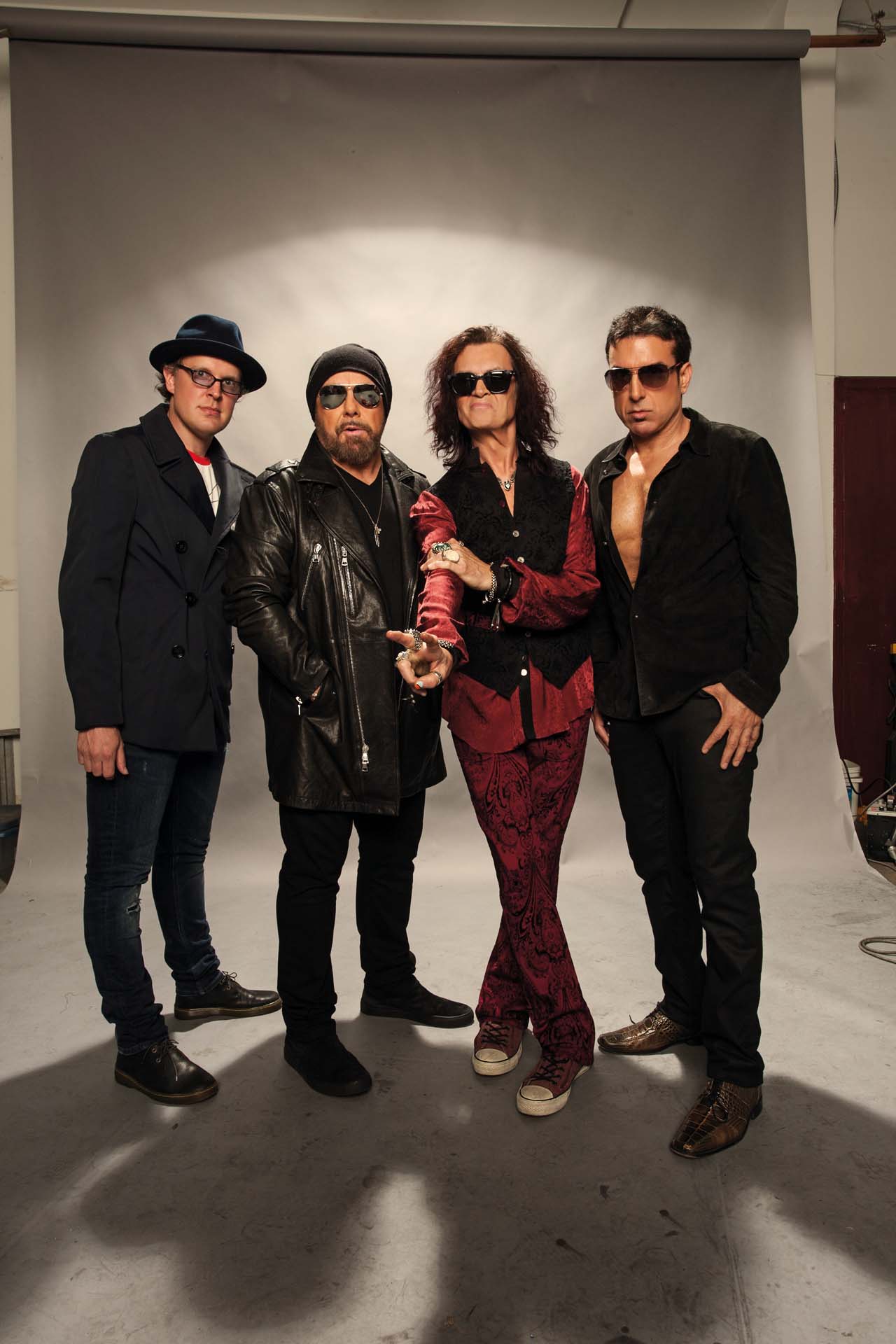
It was early one morning in 2016, while on tour in Europe, that Bonamassa had something of an epiphany. After arriving at his hotel in Düsseldorf in the afternoon of the day before a concert, he went to his hotel room and made the mistake of going straight to bed. “I was all jet-lagged and fucked up,” he remembers. When he awoke it was four a.m. and he was full of energy. The problem was that there was nothing to do. “Nothing was open, and the hotel didn’t serve breakfast till six. I had all this time on my hands. So I put on some music.”
For a lark he pulled up the BCC catalogue. Starting with the first album, he went through everything the band had recorded, even live material. It was something he hadn’t done in years – and he was riveted.
“It was remarkable,” he recalls. “As I listened to it, I started to think: ‘You know what? You’re an idiot, Joe. Most people search their entire life to find a group of musicians this special, and here we are, five years after playing our last gig and we haven’t done anything.’ It just seemed so absurd to me. Like, what a waste, you know?”
Bonamassa sent his former bandmates an email expressing this very sentiment. “I said: ‘You know what, guys? We make a really good racket when we don’t get in our own way. It would be a shame if we never got an opportunity to play again, when everybody is in their prime and is able to do it.’” To his surprise, he received responses from everybody within minutes. “Everybody was like: ‘Let’s boogie.’ ‘Let’s rock.’ ‘I’m in.’ I was really happy that we were all on the same page at exactly the same time.”
Kevin Shirley says he and Bonamassa had never really tossed around the idea of BCC working together again, and he was surprised when the guitarist sent his message to the band.
“He excluded me on that email, initially,” he points out. “I mean, I’m only the producer. I was aware that the band had cost Joe individually a lot of money, and I know that Roy [Weisman], his business partner, would have preferred to keep that curtailed. But Joe is a person who operates on emotion, and he wanted to put the band back together again. He didn’t feel they had finished what they had started.”
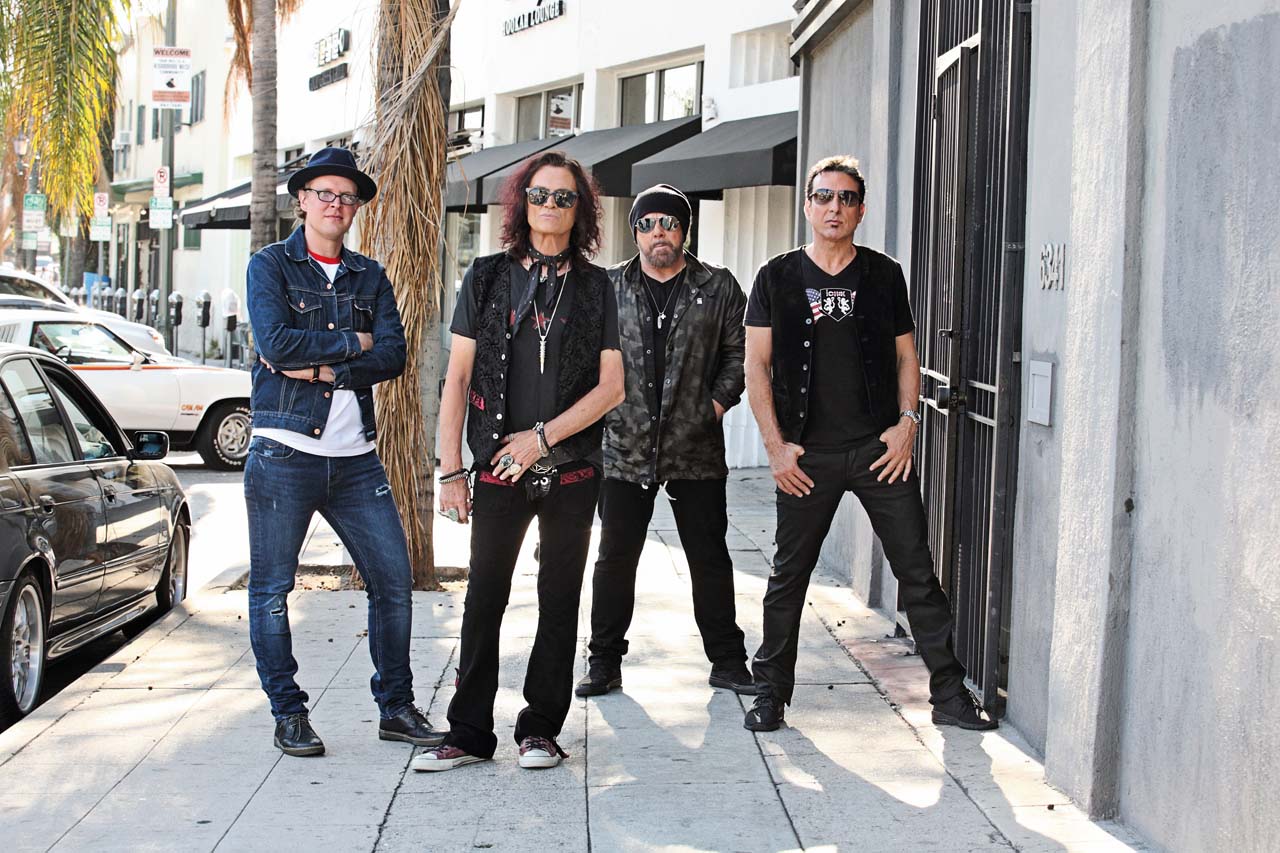
Bonamassa and Hughes met for dinner in New York City around the time that Hughes, with Deep Purple, was being inducted into the Rock And Roll Hall Of Fame, and the two men discussed plans for recording a fourth BCC album. Both agreed that the key to making a strong record was that the writing should be shared equally between them. “I was like: ‘Glenn, I’m coming to you this time,’” says Bonamassa. “‘I’ll get my guitar, I’ll get on the freeway and let’s get this thing going. Let’s get back to the very beginning of this when it was just inspired and focused.’”
“On the first three records – and I counted, too – Joe had only written at my house six times,” Hughes says. “That’s six times on three records. For this new record he was at my house ten times. That’s really speaks to what a true partnership this was.”
Both men allow that their writing sessions got off to a shaky start (“We had nothing at first,” says Hughes, “and we didn’t pull out old riffs from five years ago”), but after a couple of days they felt the spark of their old chemistry and got on a roll. Sitting side by side with guitars, they soon found that they were writing a song a day. “The best part was how we would finish each other’s sentences,” Bonamassa recalls. “If I came in with a bridge, Glenn would be right there with a chorus, and vice versa.”
After a few weeks, the bulk of the album was laid out in front of them. There was the grandiose, thundering rock of The Last Song For My Place, the sweeping, yearning, widescreen pop of Wonderlust and the riff-monster behemoth Collide. For the galloping, urgent sizzler Awake, Bonamassa worked up a dizzying, curlicue guitar line that’s about as far away from Howlin’ Wolf as you can get. “A funny thing happens when I write with Glenn,” Bonamassa says. “I take off my blues hat and I put on my classic rock hat. I don’t even have to think about it. Different riffs start flying out.”
One riff in particular gave the guitarist a moment of concern, however, on the stomping power-rocker The Crow, built on a massive guitar figure that’s equal parts Jimmy Page and Rage Against The Machine’s Tom Morello. Before recording, Bonamassa noticed that it bore too much of a resemblance to RATM’s Bulls On Parade, so it was amended slightly. “The similarity wasn’t lost on us,” he notes.
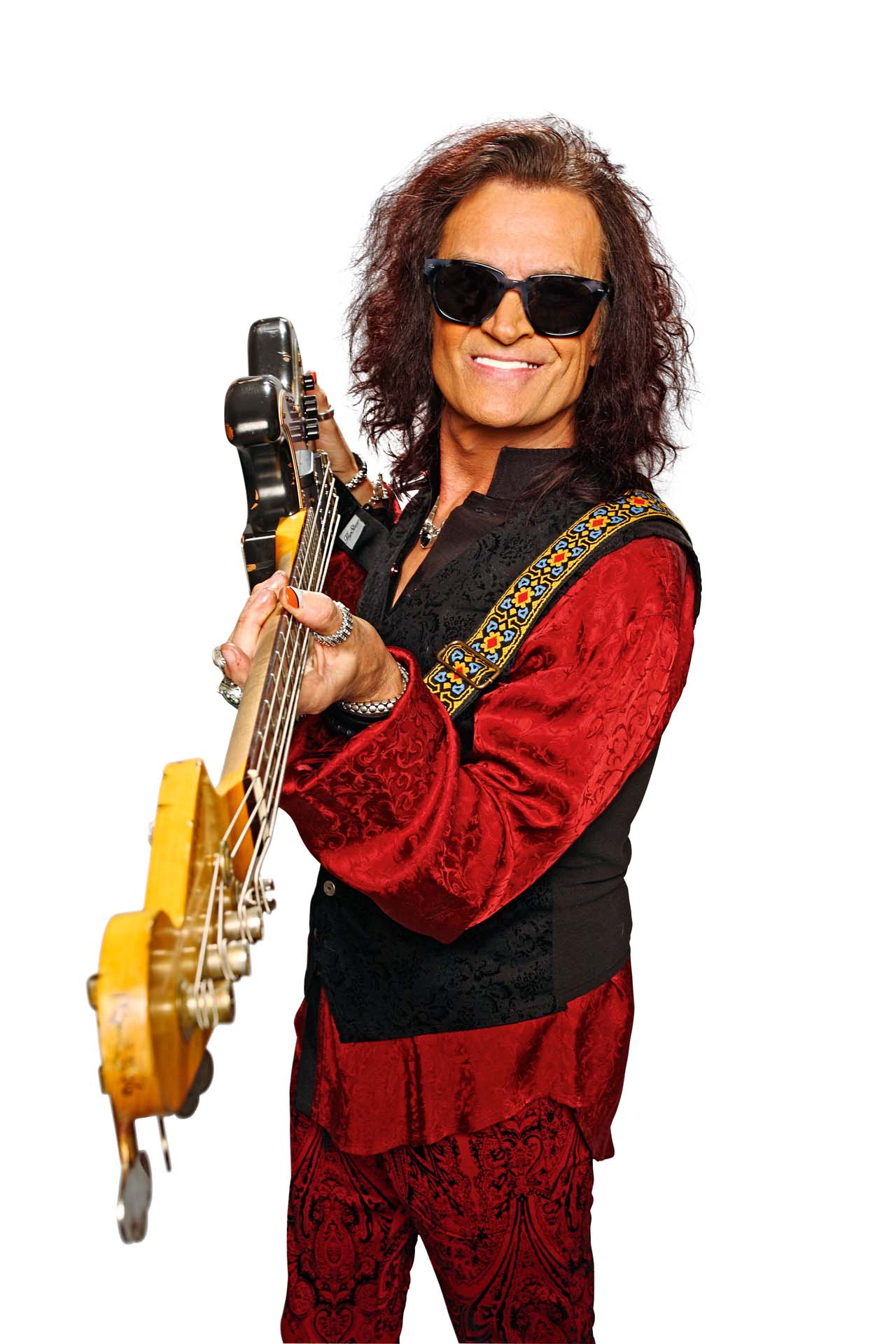
In January this year, the band and Shirley convened at EastWest Studios in Los Angeles and laid down everything Bonamassa and Hughes had written in a record four days. They had planned on spending a solid week in the studio, but Hughes had to cut his time short to fly to England to see his ailing mother (she passed away soon afterwards). “To tell you the truth, we could have spent two or three weeks in the studio and wound up with the same record,” he says. “You don’t always get better results hammering away at something once it’s finished. We knew what we were doing and we were ready.”
Some songs, however, did change significantly once the band began jamming on them. Hughes and Bonamassa both point to Sway as an example. In its recorded form, the track has a mystical and unmistakable Kashmir-like quality to it. “That’s not the way it started at all,” Hughes explains. “I wrote it as more of an uptempo thing, kind of like Michael Jackson’s Smooth Criminal. We showed it to Jason and he went: ‘How about just changing that a little bit?’ It took on more of a Zeppelin vibe, but it’s still got a bit of Michael to it as well.”
Bonamassa laughs. “That stuff just happens,” he says, “but it’s not like we say to Jason: ‘Hey, can you do a Zeppelin thing here?’ But, you know, the guy can’t help it. He’s got a thing in his DNA that no one else has. Every drummer in the world who has mastered the John Bonham style of drumming will never have that element of blood. I mean, you could bring in an Eastern Latvian folk polka and he’ll figure out a way to make it sound like When The Levee Breaks.”
If it was up to Bonham, he would have put more of a Zeppelin spin on the album. “Oh yeah, I do a couple of those things,” he says, “and I’m quite proud of them. You know, I play the way I play, and so I’ll throw a Black Dog lick in here and there or whatever. The hardest thing about recording with Kevin is I never get to redo my drums. He has his way of doing it, and it’s like drum tracks are made by an editor sometimes. It pisses me off.”
When asked how recording the new album differed from previous BCC albums, Sherinian braces for a moment, then responds snarkily: “The biggest difference was that Jason and I were excluded from the writing process.” As an aside, he adds: “I’m just happy that you can finally hear me in the mix.”
Bonamassa later seems surprised that the issue of group songwriting came up. “I didn’t think it was so big a deal,” he says. “It’s not like Glenn and I go in there and say: ‘Here’s our songs, they have to go this way.’ It’s not like that at all. Songs change and people contribute. If you’re that married to a song, save it for your solo career, you know?”
Shirley sees the matter this way: “I feel Jason and Derek should have been included more, but in my opinion they sometimes cut off their noses to spite the face. Derek and Jason, and even me on the odd occasion, offer really interesting collaborations and insights to the material, but Glenn is definitely the key writer in the band. And he’s very, very talented and good at it, too. Joe writes entirely differently for BCC than he does for himself – it’s kind of almost storytelling, an Iron Maiden-like thing.
“I don’t think Glenn enjoys being confrontational,” he continues, “and there’s also some pretty bad writing that gets submitted. Every bone in his body is saying: ‘This is shit,’ but he doesn’t want to offend people. Glenn is actually pretty funny. He doesn’t love all the progressive rock stuff, and whenever those solos come around, he likens it to trolls and leprechauns dancing. Jason is one of the most amazing musicians you could meet. He has so many ideas that it’s tough to rein him in, and I think it’s a mistake to have excluded him. But he does it to himself by being very difficult to get a hold of sometimes.”

The afternoon is drawing to a close as the four band members gather together for group and individual photos. After a series of indoor ones are snapped, the guys head outside and hang out on Sunset Boulevard as photographer Neil Zlozower continues to click away. Hughes keeps everybody giggling with a steady stream of ribald jokes, all of which seem to end with the same punchline: “Well, it isn’t gonna suck itself!”
So far there are no BCC gigs on the books for 2017, although the band ares scheduled to play three shows in the early part of next year – two UK dates and one aboard an ocean liner as part of Bonamassa’s annual Blues At Sea Cruise. Somewhat surprisingly, the matter of touring wasn’t a deal-breaker when Bonamassa first proposed the idea of re-forming. “We didn’t set any conditions of any kind,” Sherinian says. “We just said: ‘If we’re gonna do a record, let’s do it.’ There was no mandate for touring.”
Hughes, in the past the most keen member to tour, now says he’s adopted a ‘whatever happens happens’ credo regarding the future of Black Country Communion.
“The key to my life these days is that I have no expectations,” he explains. “I bear no resentments. I do this one day at a time, knowing full well that what we did on album number four made me a better human being. I’m going to keep doing things the same way. I’m so glad we did this one because it’s brought us closer together. I just feel blessed to play with these guys.”
So that means no more mean tweets? Hughes laughs. “No,” he says, “there will be none of that going on.”
“Here’s the deal,” says Bonamassa. “You can’t erase the past, but I don’t want to be one of those guys who takes shit to the grave. Fuck that. This goes back to that morning I sent the email to everybody. It’s like I woke up and said to myself: ‘Self, life is way too short to keep this burdensome shit going. We had fun in 2010. We had fun in 2011 and 2012, and we had a blast making the new album. So as long as that lasts, let’s keep doing this.’
“The world doesn’t need a bunch of bitter old coots making music by obligation,” he concludes. “You have that with other bands, but who needs it? There’s too much content out there already. But if a band wants to make music and they come out of the gate with the right record? Hey, the world can use that. I’m really proud that we’ve all gotten to this place together.”
IV is out now via Mascot Records
Glenn Hughes talks new Black Country Communion album
Glenn Hughes proves he’s still one of rock’n’roll’s ultimate frontmen
Joe is a freelance journalist who has, over the past few decades, interviewed hundreds of guitarists for Guitar World, Guitar Player, MusicRadar and Classic Rock. He is also a former editor of Guitar World, contributing writer for Guitar Aficionado and VP of A&R for Island Records. He’s an enthusiastic guitarist, but he’s nowhere near the likes of the people he interviews. Surprisingly, his skills are more suited to the drums. If you need a drummer for your Beatles tribute band, look him up.
